Wednesday 1st September
Six letters from soldiers were published in the E&L, expressing many thanks for parcels received from the Comforts Committee.
Lieutenant Colonel Herbert Scott, fifth son of the late 6th Duke of Buccleuch, has been appointed Assistant Military Secretary. He served in the Second Boer War, the Dardanelles and France, where he was injured, resulting in a transfer to civilian duties.
Friday 3rd September
The town’s annual September holidays are from today until Monday, with many shops being shut today and tomorrow. Various holidays are set at town rather than national level.
The Sunday School of the Congregational Church had an all-day outing to Hollows Bridge, travelling by train. Over 100 people participated in the day which included a picnic and games.
The Langholm Territorial Miniature Rifle Club organised different types of competitions at the High Mill open range: bull-scoring, handicap and pairs. Entry fees were given to the local Red Cross fund.
Saturday 4th September
Miss Janet Scott, who was given a farewell presentation by the Woman’s Guild a little over two weeks ago, was on her way to join a relative in Canada on RMS (Royal Mail Ship) Hesperian when it was torpedoed at 8.30 pm off the coast of Ireland. A lifeboat tilted over when being lowered, resulting in 32 being drowned, but all others survived, including Janet. She was rescued at about one a.m. but her luggage was lost.
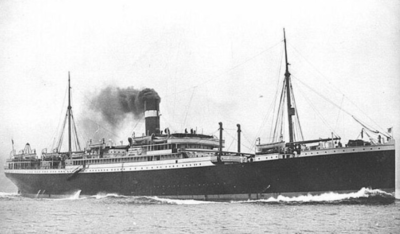
Also lost were the remains of Canadian philanthropist Frances Stephen, being repatriated after her death from the sinking of RMS Lusitania. Both the Hesperian and the Lusitania were sunk by the same submarine (U20) and captain, Walther Schwieger.
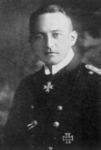
Three signalmen pleaded not guilty at the Dumfries High Court to causing the Quintinshill disaster through breach of duty. The trial will take place in Edinburgh later this month.
Tuesday 7th September
Thomas Milligan, son of Thomas Milligan, joiner, was hit by shrapnel near his right shoulder while bathing on the coast after 25 days in the trenches. He is hospitalised but the wound is not severe.
The new school term began.
Langholm station won an intermediate award for being one of the best kept North British Railway stations.
The heather on the hills around Langholm is being affected by a blight caused by an insect known as the Heather Bug.
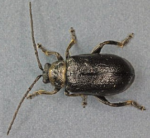
The City of Carlisle Electric Tramway Company has employed four women as conductors. Two are on duty and two are in training.
Wednesday 8th September
A specially designed ambulance train, constructed by the Caledonian Railway Company, will soon be commissioned to run from near the Western Front to the French coast. It has capacity for over 450 patients and nearly 50 medical staff, and incorporates an operating theatre. Painted khaki colour with red Geneva Cross symbols, it is being called the ‘Khaki Train’. There are already a number of ambulance trains in operation in France and the UK but are mostly converted rolling stock rather than being custom built.
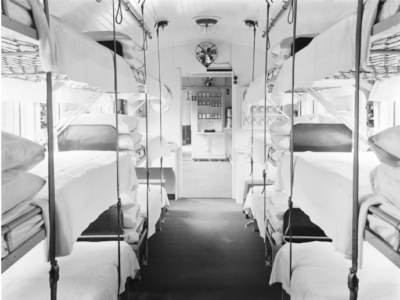
Alexander Sharp (15) has received a letter from Robert McGeorge, in charge of the Langholm platoon of 1/5th KOSB, for sending them 48 tins of condensed milk, bought with the proceeds of subscriptions that he had collected.
- Letter from William Thomson, Scots Guards, to brother and sister, Factory Entry. Wounded three times.
Wednesday 8th September
There is an increasing number of money-lending adverts, notably from Carlisle companies.
Thursday 9th September
A town council meeting was held, beginning with welcoming Major Bell back to Langholm on furlough after being wounded. He has been on leave of absence as a councillor, which was extended for another year.
A circular from the Local Government Board stated that there will be no elections for councillors this year and that retiring members will sit for another term.
John Goodfellow, convenor of the Lighting Committee, said that there had been some very dark weather and many complaints about the lack of street lighting. The committee was authorised to implement a scheme that does not involve a complete blackout or the lighting of all lamps.
Saturday 11th September
Mr Simson, house steward to the Duke of Buccleuch, had a hole in one at the 6th on Langholm Golf Course. This repeats his achievement on the 8th hole before the course was redesigned.
This week has also seen good results for grouse shooting, with a total of 447 brace across three locations in the area. A Langholm Lodge party achieved the majority on the Liddesdale moors and 47 brace were bagged at Broomholm by a party hosted by Ary Miesegaes.
Monday 13th September
A new lighting scheme is being implemented from today. Every second lamp is to be lit on the High Street and various lamps with less frequency in other streets.
A Langholm School Board meeting received a report that medical inspections had been made of 178 pupils in the Infant School and Academy in July. A large number were found to have complaints, many of which were recommended to be treated by families’ own doctors. Dental inspections of six to eight year olds had also been made, with recommendations for tooth removals or ‘stopping’ [fillings] being made. The inspector is due again this week, after which a special meeting will be held.
Tuesday 14th September
The trial of James Tinsley, signalman, George Meakin, signalman, and George Hutchison, fireman, began in the Edinburgh High Court, Lord Strathclyde (Alexander Ure) presiding.
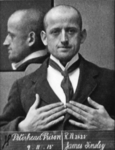
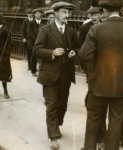
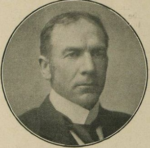
Harrison and Son held their third and final special lamb auction, selling over 2000 half-bred and Cheviot lambs.
Wednesday 15th September
In the Edinburgh High Court, arguments and summing up were concluded and the jury retired for 10 minutes before delivering its verdicts: Tinsley and Meakin were found guilty and Hutchison not guilty. The judge sentenced Tinsley to three years’ penal labour and Meakin to eighteen months’ imprisonment.
Bait fishing in the Esk and Liddle closed at the end of today. Catches have been moderate over the last week and several otters have been seen. Fly and creel fishing continue.
The Lanarkshire Yeomanry is under orders for service abroad. It is composed of soldiers from Lanarkshire, Dumfriesshire and Peebleshire, and includes seven from Langholm.
William Herries is back near the Western Front with the YMCA and is appealing for books for the library: ‘one shilling will buy a book, and a single book may give instruction, inspiration and recreation to hundreds of soldiers who have staked their lives for our safety. … Sweets, chocolates, etc., are very necessary comforts, but books give a source of deeper comfort and lasting pleasure.’
Dumfriesshire farmers are concerned about increases in labour rates as 7 1/2d per hour is being paid by the new Gretna munitions factory, adding a penny an hour for many farms in the area to retain their workers.
Seventy men from 3/5th KOSB left Dumfries under the command of two second lieutenants to reinforce 1/5th Battalion.
Wednesday 22nd September
Prime Minister Asquith announced that the war is costing £3.5 million pounds per day and the debt incurred now stands at £1,262,000 […]. There are 20 national shell factories operating and 18 more are under construction.
- Tweed market:
Saturday 25th September
Nine Langholmites lost their lives on the first day of the Battle of Loos, the worst day of the war for Langholm so far. At least fifteen others were wounded.
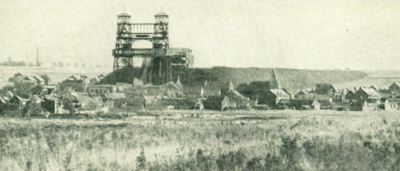
Joe Borthwick (19), 10th Gordon Highlanders, saw an old Langholm friend, Jock Tudhope, passing a nearby trench and called out. Jock heard him and turned round:
Here was my old chum, lying with some other Gordons, waiting their turn, and he was smiling as if he was enjoying it. I only had time to shout, ‘Hallo, Joe’, and had to move on. It put new heart into me, seeing a Langholm face.
Joe was killed a few hours later. He was a warehouseman at Ford Mill, the son of James, a tanner.
John Comrie (32), 9th Black Watch, was also a Ford Mill employee, a power loom tuner. He and his wife Jane have had eight children, three of whom died in infancy, and another is due imminently. Their youngest is called Bertha Roeber Comrie, probably after a German-born nurse who worked until a few months ago at the Thomas Hope Hospital, sometimes attending births outside the hospital. Perhaps she helped to prevent another Comrie infant death. She left the UK after 35 years of residency because of anti-German hostility towards her.
William Elliot (33), 7th KOSB, was a wool sorter at Buccleuch Mill, the son of John, also a wool sorter. He had a wife Elizabeth and a son, and was a good cricketer.
James MacKnight, (36), 8th Queen’s Royal Regiment, was formerly an apprentice to Robert Scott, printer, and a member of Chalmers Church.
John Malcolm (20), 7th KOSB, was carrying a tank of explosive material that was hit by shrapnel. He was an apprentice joiner with James Telford in Parliament Square and played for Langholm Rugby Club. His elder brother James, who was employed by William Milroy, ironmonger, was wounded through the right hand.
Isaac Scott (26), 7th KOSB, was the youngest of Sarah Scott’s five soldier sons (see 12th May). He worked at Waverley Mill.
James Scott (19), 7th KOSB, known as ‘Mac’, was the son of Captain James and Marian Scott, late of Kilncleuch (currently empty). James senior recently became political secretary to Samuel Samuels, MP for Wandsworth. His eldest son John died of wounds in November last year.
David Thomson (24), 7th KOSB, was a hairdresser’s apprentice with James Barr in Langholm, then a worker in the Singer sewing machine factory in Clydebank, Glasgow.
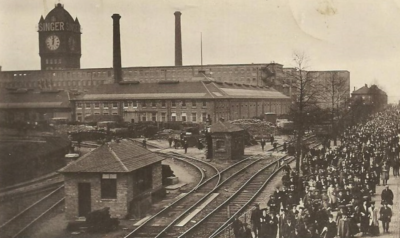
Frank Thomson (22), 2nd Border Regiment, was an apprentice tanner with Charles Paisley. He enlisted in the New Year of 1914 and was a bomb thrower.
Sunday 26th September
During the night John Tudhope was severely injured by an artillery shell but managed to crawl more than a mile to a safer area in the brief periods when German star shells were not lighting up the sky. He lay down exhausted among dead horses and men and envied them being out of pain. About an hour later he was noticed by a British officer and was carried a mile by stretcher to a treatment station.
The Dumfries branch of the National Union of Railwaymen passed a resolution demanding the release of its two convicted members, Tinsley and Meakin. A prior resolution calling for a reduction of sentences was withdrawn in favour of the one that was passed.
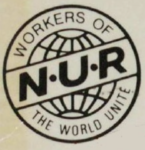
Keir Hardie, the first Labour parliamentary leader (1906 to 1908), died of pneumonia in a nursing home in Glasgow. Born in Lanarkshire, he worked in coal mines from age 10 and developed his oratory skills as a preacher in the Evangelical Union Church.
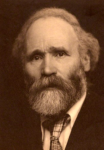
Monday 27th September
After a report by the Burgh Treasurer William Elton, solicitor, the Town Council imposed the following rates for the 1915-16 property year, showing the categories used to calculate the total assessment. These figures are applied to the value of each owner’s and occupier’s property, e.g. an occupier in a property with a rateable value of […] pays […] x 1 shilling 9 1/2 pence = […] in rates for the year.

The above is a slight increase for owners and a slight decrease for occupiers versus last year. Ratepayers may lodge an appeal by 4th November against their property valuations; the appeals will be heard on 11th November; and rate payments will be due on 4th December.
Tuesday 28th September
The Star of Eskdale Lodge of the IOGT held a temperance meeting in the EU Church hall with an address by Robert Copeland, tweed finisher, followed by music and recitations.
The grain harvest has been good this year due to favourable weather.
Reginald McKenna, successor to David Lloyd George as Chancellor of the Exchequer, presented his first budget in which he anticipates an increase in government revenue of 11 percent by raising income taxes and customs duties and by introducing an ‘excess profit tax’ on profits which have increased during the war period.
Wednesday 29th September
The Press Bureau warned that anyone who shoots a carrier pigeon while it is on His Majesty’s service is liable to prosecution.
A letter from a soldier complimented the Langholm Comforts Committee’s parcel packing, saying, ‘I frequently see practically nothing but a piece of string and a label delivered to a man, but your parcels arrive intact and your method of packing has evoked a good deal of comment’.
On reporting several casualties, the E&L notes that ‘various rumours have been afloat in the town as to further casualties to local men but on investigation we have found these to be entirely without foundation.’
Rev George Orr will replace Robert Scott as the local treasurer for the Royal Infirmary of Edinburgh which raises funds from around the country.
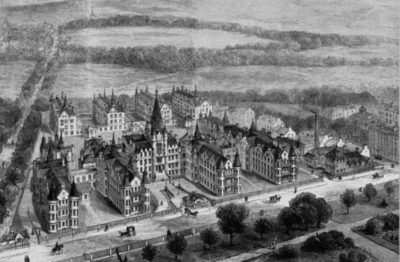
- Arrival of 60 Irishmen at Silloth for Gretna.
Friday 30th September
John Wright, a 32-year-old tailor with the Royal Scots, was killed near Hooge, Belgium, on the eastern boundary of the Ypres Salient (bulge into enemy territory). His late father was a weaver and his brother Richard is with the Seaforth Highlanders.
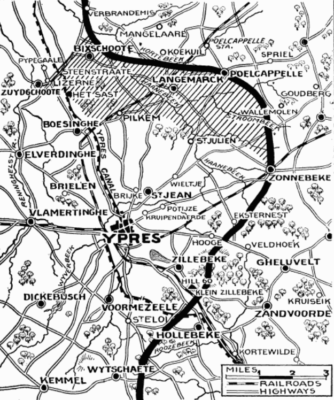
John had five brothers called George, four of whom died in infancy. It is not uncommon for the same name to be used for a subsequent child after an infant death, but four times is unusual, perhaps in a determined attempt to have a living son named after his father. The fifth George died aged 12 in 1906, a week after his mother and a year after his father, so his parents were not aware of the final misfortune. In all, George senior had 16 children by two wives, including two sets of twins, with only eight surviving into their teens.
The matron and patients of the Red Cross Hospital were invited for tea at Langholm Lodge by the Duchess of Buccleuch.